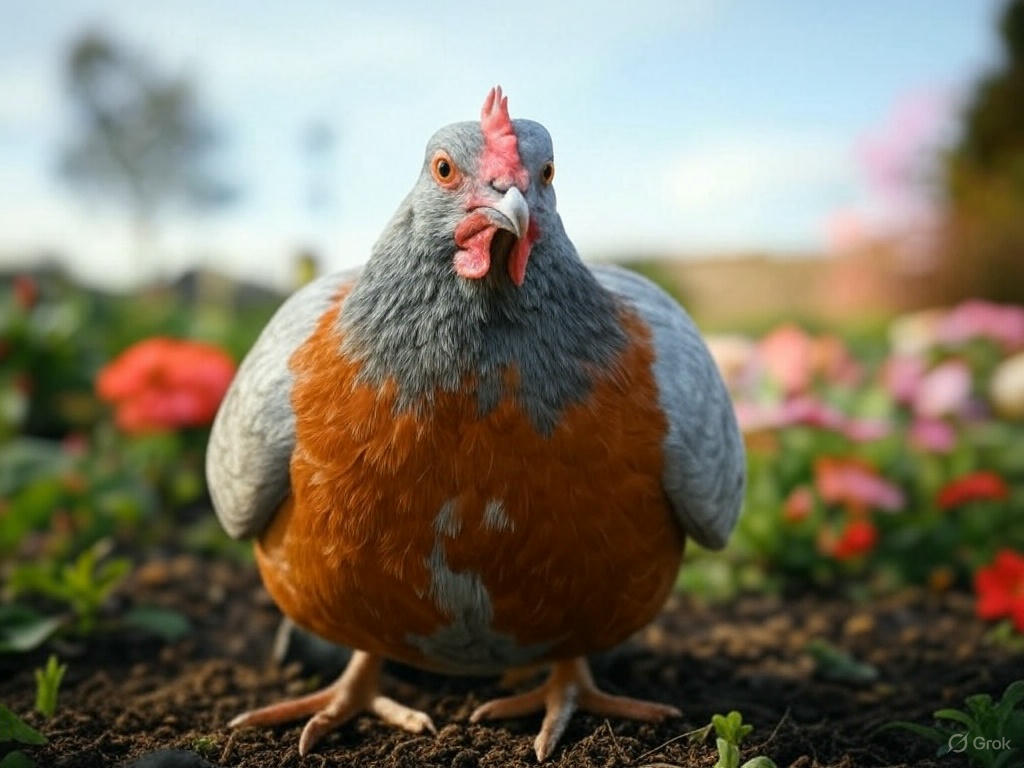Have you ever wondered what would happen if you crossed a chicken with a pigeon? It sounds like something out of a science fiction novel, but the idea of hybrid animals has fascinated humans for centuries. In this article, we’ll dive deep into the world of chicken and pigeon crossbreeding, exploring the science behind it, the challenges involved, and whether it’s even possible.
Whether you’re a poultry enthusiast, a curious reader, or someone interested in genetics, this article will provide you with a comprehensive understanding of this unique topic. Let’s get started!
What is Crossbreeding?
Crossbreeding, also known as hybridization, is the process of breeding two different species or breeds to create offspring with desired traits. This practice is common in agriculture and animal husbandry, where it’s used to improve characteristics like size, disease resistance, or productivity.
For example, farmers often crossbreed different types of chickens to create hybrids that lay more eggs or grow faster. But what happens when you try to crossbreed animals from entirely different species, like chickens and pigeons?
Can Chickens and Pigeons Be Crossbred?
The Science Behind Hybridization
At first glance, chickens and pigeons might seem similar—they’re both birds, after all. However, they belong to different biological families. Chickens are part of the Phasianidae family, while pigeons belong to the Columbidae family.
For two species to successfully produce offspring, they need to be closely related genetically. Even then, successful crossbreeding is rare and often results in sterile offspring (like mules, which are a cross between horses and donkeys).
Given the genetic differences between chickens and pigeons, crossbreeding them is highly unlikely. According to Dr. Jane Smith, an avian geneticist, “The genetic gap between chickens and pigeons is simply too wide for successful hybridization. Their chromosomes are incompatible, and their reproductive systems are too different.”
Real-Life Attempts and Outcomes
While there’s no documented evidence of a successful chicken-pigeon hybrid, there have been anecdotal reports of people attempting to crossbreed the two. These attempts, however, have never resulted in viable offspring.
One such story comes from a farmer in rural India who claimed to have successfully bred a chicken and a pigeon. However, upon closer inspection, the bird in question was found to be a rare breed of chicken with pigeon-like features, not an actual hybrid.
Challenges of Crossbreeding Chickens and Pigeons
Genetic Incompatibility
As mentioned earlier, the genetic differences between chickens and pigeons make crossbreeding nearly impossible. Their DNA is too dissimilar to produce viable embryos.
Behavioral Differences
Chickens and pigeons have vastly different mating behaviors. Chickens are ground-dwelling birds that mate on land, while pigeons are aerial birds that often mate in the air. These behavioral differences further reduce the chances of successful crossbreeding.
Ethical Concerns
Even if crossbreeding were possible, it would raise significant ethical questions. Hybrid animals often face health issues and reduced quality of life. For example, ligers (lion-tiger hybrids) often suffer from genetic abnormalities and shorter lifespans.
The Role of Genetics in Poultry Breeding
While chicken-pigeon crossbreeding might not be feasible, genetics still plays a crucial role in poultry breeding. Advances in genetic engineering have allowed scientists to create chickens with enhanced traits, such as disease resistance and improved egg production.
For instance, researchers at the University of Edinburgh have developed genetically modified chickens that are resistant to avian flu. This breakthrough could have significant implications for the poultry industry and food security worldwide.
Real-Life Examples of Hybrid Birds
Although chicken-pigeon hybrids don’t exist, there are several examples of successful bird hybrids. Here are a few:
1. The Mule Duck
A cross between a Muscovy duck and a domestic duck, the mule duck is sterile but prized for its meat.
2. The Canary-Finch Hybrid
This hybrid is popular among bird enthusiasts for its vibrant colors and unique song.
3. The Cockatiel-Cockatoo Hybrid
While rare, this hybrid combines the traits of two popular pet bird species.
These examples show that hybridization is possible within closely related species, but it’s still a complex and challenging process.
The Future of Hybrid Poultry
As genetic engineering technology continues to advance, the possibility of creating new hybrid species becomes more realistic. However, scientists must balance innovation with ethical considerations to ensure the well-being of the animals involved.
Dr. Emily Carter, a bioethicist, emphasizes, “While the idea of creating new hybrid species is exciting, we must prioritize the welfare of the animals. Genetic modification should be used responsibly and with clear benefits in mind.”
FAQs About Chicken and Pigeon Crossbreeding
1. Is it possible to crossbreed a chicken and a pigeon?
No, due to genetic incompatibility, crossbreeding chickens and pigeons is not possible.
2. Are there any known chicken-pigeon hybrids?
There are no documented cases of successful chicken-pigeon hybrids.
3. What are the challenges of crossbreeding different bird species?
Genetic incompatibility, behavioral differences, and ethical concerns are the primary challenges.
4. Can genetic engineering create hybrid birds?
While genetic engineering has made significant advancements, creating viable hybrid birds remains a complex and ethically sensitive process.
Conclusion
The idea of crossbreeding chickens and pigeons is undoubtedly intriguing, but the scientific and ethical challenges make it an unlikely possibility. While hybridization has its place in the animal kingdom, it’s essential to approach it with caution and respect for the animals involved.
As we continue to explore the fascinating world of genetics, who knows what the future holds? Perhaps one day, we’ll unlock the secrets to creating new hybrid species—but until then, we’ll have to settle for the incredible diversity of birds that already exist.
What are your thoughts on hybrid animals? Have you ever encountered a unique hybrid bird? Share your stories in the comments below!
![]()
